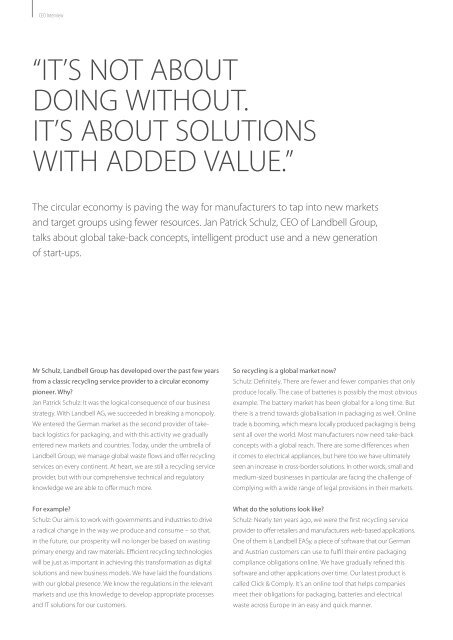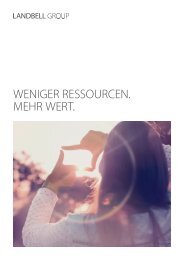20171201_01_LB_2017_Imagebroschuere_UK_210x297_einzelseiten
You also want an ePaper? Increase the reach of your titles
YUMPU automatically turns print PDFs into web optimized ePapers that Google loves.
CEO Interview<br />
“IT’S NOT ABOUT<br />
DOING WITHOUT.<br />
IT’S ABOUT SOLUTIONS<br />
WITH ADDED VALUE.”<br />
The circular economy is paving the way for manufacturers to tap into new markets<br />
and target groups using fewer resources. Jan Patrick Schulz, CEO of Landbell Group,<br />
talks about global take-back concepts, intelligent product use and a new generation<br />
of start-ups.<br />
Mr Schulz, Landbell Group has developed over the past few years<br />
from a classic recycling service provider to a circular economy<br />
pioneer. Why?<br />
Jan Patrick Schulz: It was the logical consequence of our business<br />
strategy. With Landbell AG, we succeeded in breaking a monopoly.<br />
We entered the German market as the second provider of takeback<br />
logistics for packaging, and with this activity we gradually<br />
entered new markets and countries. Today, under the umbrella of<br />
Landbell Group, we manage global waste flows and offer recycling<br />
services on every continent. At heart, we are still a recycling service<br />
provider, but with our comprehensive technical and regulatory<br />
knowledge we are able to offer much more.<br />
So recycling is a global market now?<br />
Schulz: Definitely. There are fewer and fewer companies that only<br />
produce locally. The case of batteries is possibly the most obvious<br />
example. The battery market has been global for a long time. But<br />
there is a trend towards globalisation in packaging as well. Online<br />
trade is booming, which means locally produced packaging is being<br />
sent all over the world. Most manufacturers now need take-back<br />
concepts with a global reach. There are some differences when<br />
it comes to electrical appliances, but here too we have ultimately<br />
seen an increase in cross-border solutions. In other words, small and<br />
medium-sized businesses in particular are facing the challenge of<br />
complying with a wide range of legal provisions in their markets.<br />
For example?<br />
Schulz: Our aim is to work with governments and industries to drive<br />
a radical change in the way we produce and consume – so that,<br />
in the future, our prosperity will no longer be based on wasting<br />
primary energy and raw materials. Efficient recycling technologies<br />
will be just as important in achieving this transformation as digital<br />
solutions and new business models. We have laid the foundations<br />
with our global presence. We know the regulations in the relevant<br />
markets and use this knowledge to develop appropriate processes<br />
and IT solutions for our customers.<br />
What do the solutions look like?<br />
Schulz: Nearly ten years ago, we were the first recycling service<br />
provider to offer retailers and manufacturers web-based applications.<br />
One of them is Landbell EASy, a piece of software that our German<br />
and Austrian customers can use to fulfil their entire packaging<br />
compliance obligations online. We have gradually refined this<br />
software and other applications over time. Our latest product is<br />
called Click & Comply. It’s an online tool that helps companies<br />
meet their obligations for packaging, batteries and electrical<br />
waste across Europe in an easy and quick manner.



